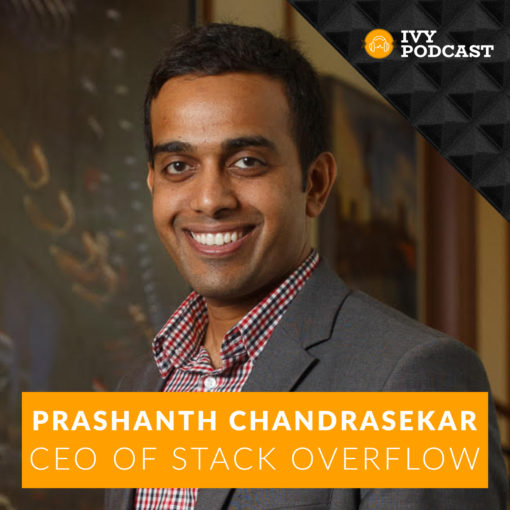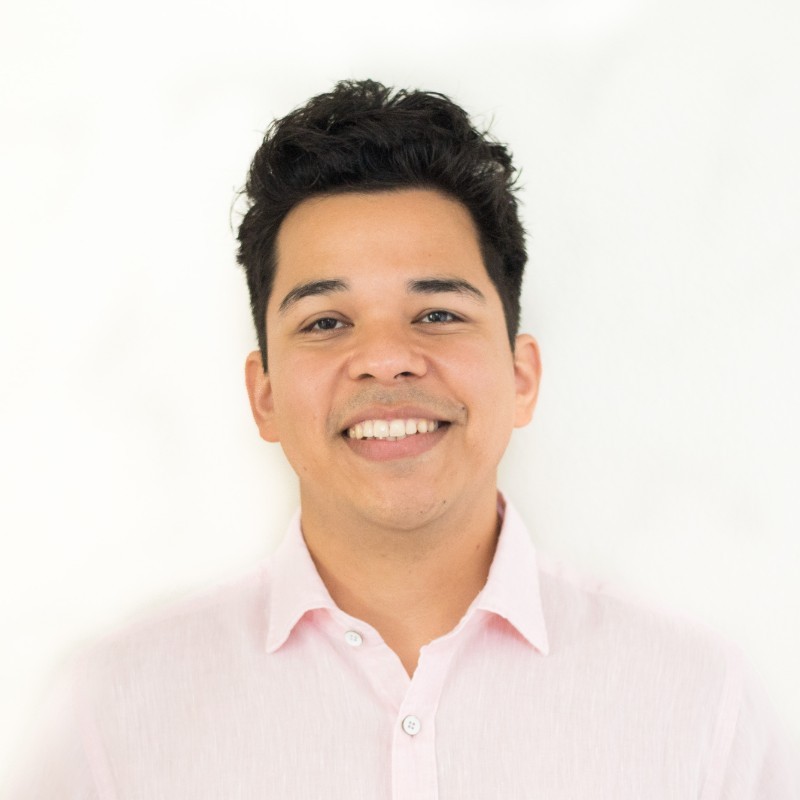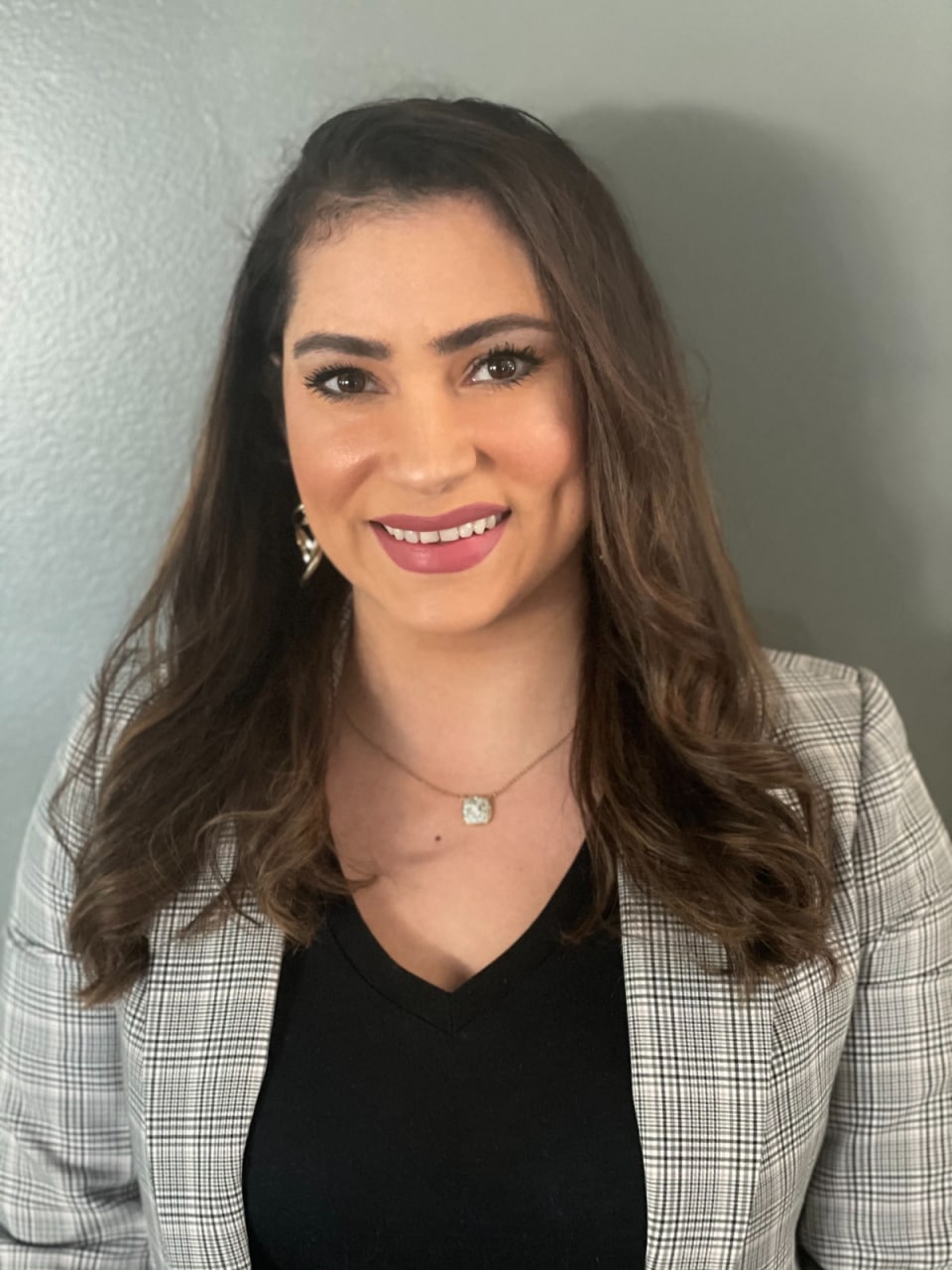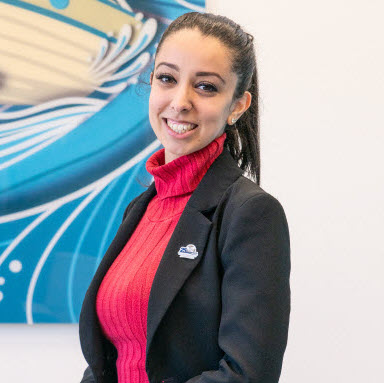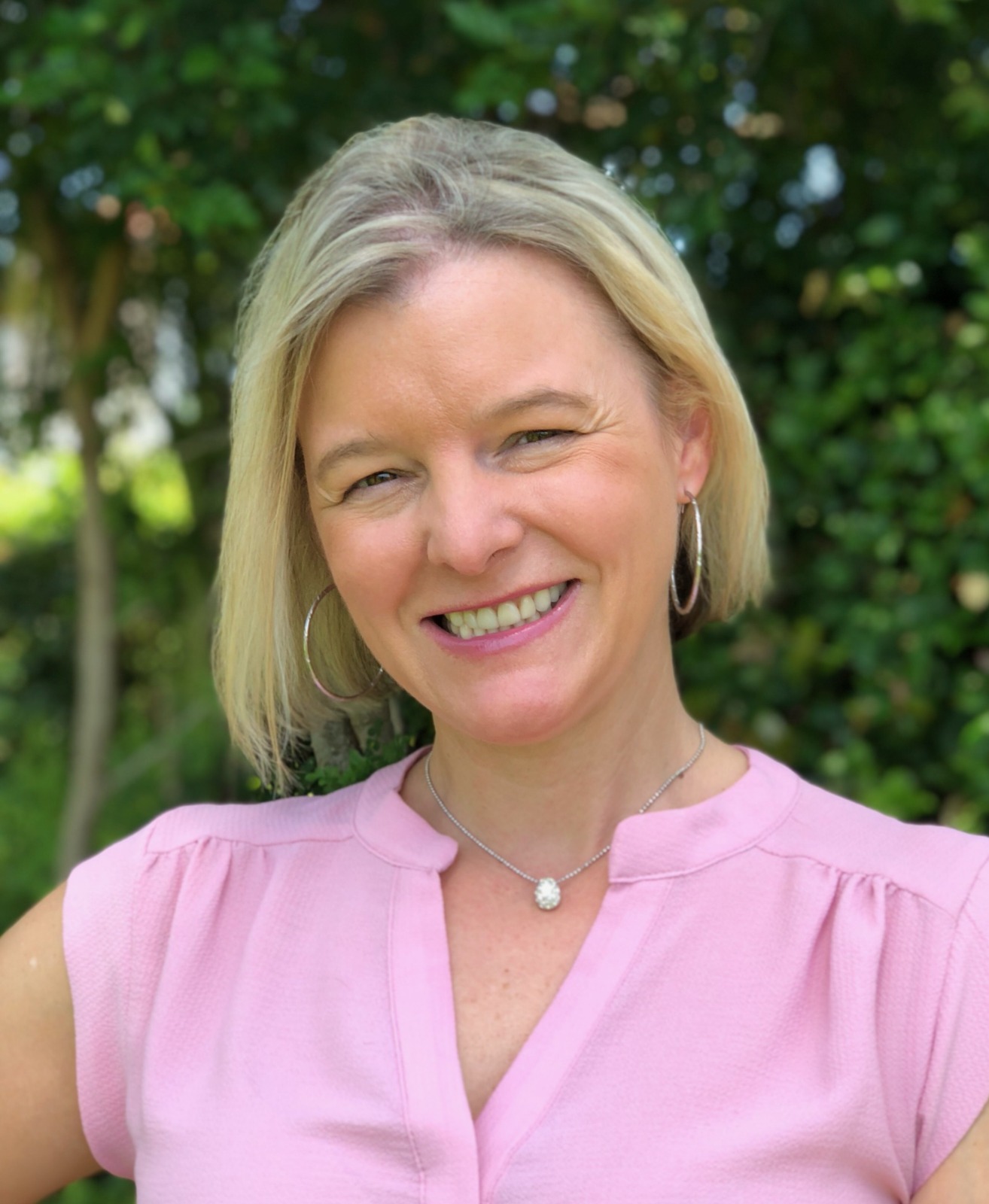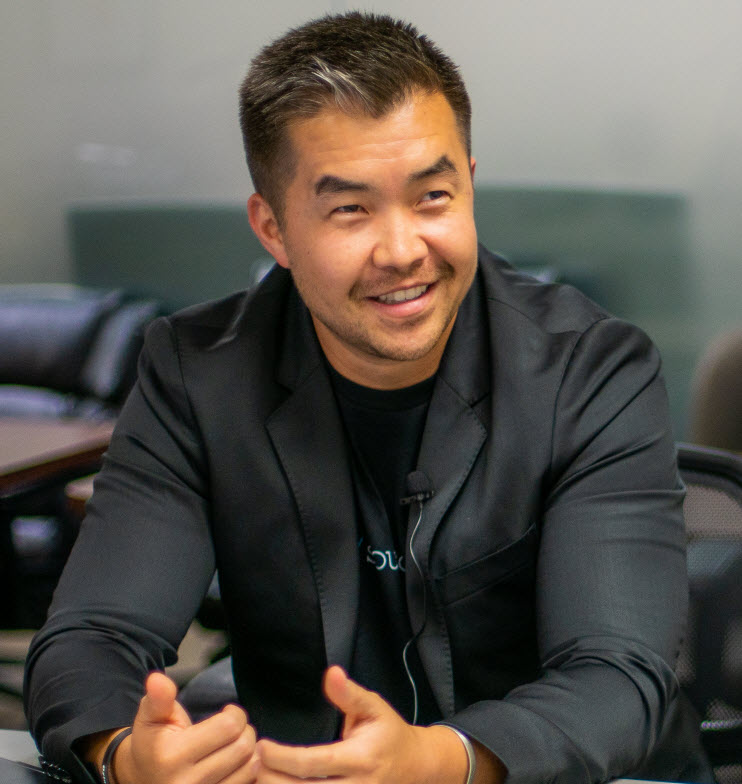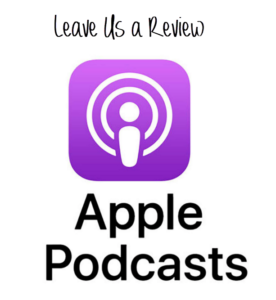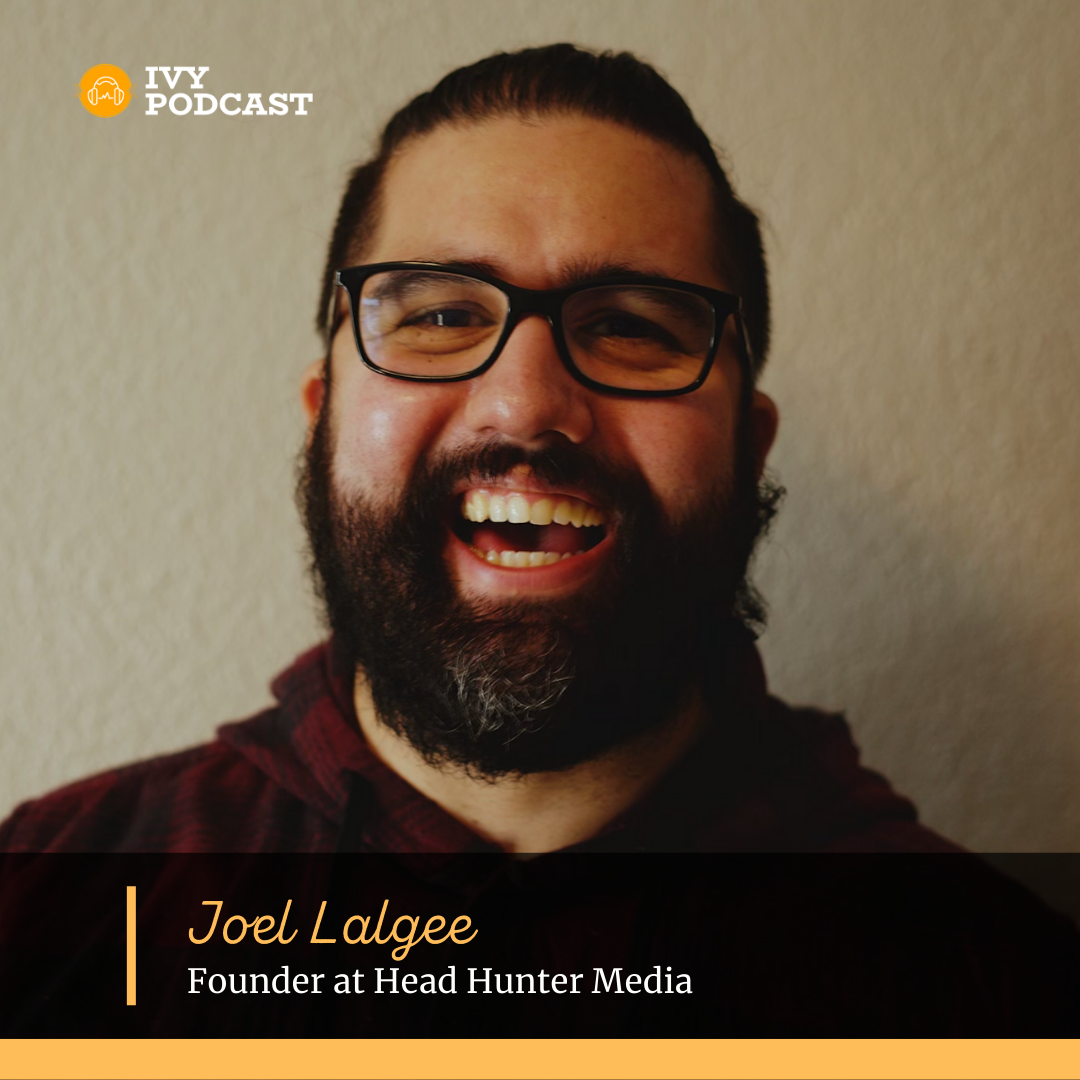
In the span of just a year, Joel Lalgee has become one of the top voices for recruiters to follow on LinkedIn. Having garnered a massive audience while establishing his own live-time series, Joel has interviewed some of the most renowned figures in the recruiting and staffing space. Join us as he guides us through the characterization of the modern day recruiter and best tips for establishing your own personal brand on LinkedIn.
Episode transcription:
[00:00:27] Angela Alberty: [00:00:27] Okay, so excited to have this podcast today. Joel, I have been waiting for several weeks now to interview. You were one of the first people that I reached out to when I made the announcement as podcast host at the Ivy Podcast. Go ahead and give the audience a brief introduction. [00:00:43] Joel Lalgee: [00:00:43] Oh yeah, absolutely. Well, first of all, thank you for having me on the show. It's a pleasure to be here. A little bit about myself. I am a recruitment head Hunter agency recruiter. That's been in the business for about five years, and I've recently made a transition into the content marketing world, helping agency recruiters build a personal brand, particularly on LinkedIn. So I've spent the last 18 months building a pretty decent sized brand on LinkedIn. Got a lot of experience with that. And so now I'm helping other people to do the same thing. And so, yeah, again, just thank you for having me on the show. [00:01:27] Angela Alberty: [00:01:27] Oh absolutely super excited for this, because I think that the audience can leverage a lot of the insight that you provide. And one of your, I guess, feel good stories is how you found it and landed yourself into this role. But we can get into that in just a little bit. We're going to start with some fire and eyes questions. And I feel the vibe today, you're black, I'm red public fire knife questions because it's the ring of fire ring of fire questions, but it's also to break the ice. So we want to just get to know you a little bit better and ask you super random questions along the way. So are you a coffee guy or a tea guy? [00:02:03] Joel Lalgee: [00:02:03] Oh, well, so I was born in England, so I still have a little bit of tea in me. Yeah. So my whole family is tea, but I definitely like coffee in the morning, coffee in the afternoon. High energy coffee. [00:02:18] Angela Alberty: [00:02:18] Yeah, me too. Me too. I've got that simple American coffee plantation lineage of coffee drinkers. So actually, my followup question, which you may have just answered is the most interesting fact about you that most people wouldn't associate to Joel. [00:02:34] Joel Lalgee: [00:02:34] Yeah. I would say being born in the UK. So I was born in England. And I moved here in 2000. And so I've, that's why the British excellent. When you're in middle school and you have a different voice and everybody else doesn't go well. And so, in any attempt to be cool, I started saying what's up man and hey everybody, before it I'm sounding American. [00:03:05] Angela Alberty: [00:03:05] Yeah, absolutely. Okay. So this one's pretty interesting. What's the worst job you've ever had. [00:03:12] Joel Lalgee: [00:03:12] Yeah, that's a great question. [00:03:13] Angela Alberty: [00:03:13] You could, that's right. So something maybe… [00:03:19] Joel Lalgee: [00:03:19] In a call center, for about six months and I was working for one of the big, well, I was working at an agency that represented one of the big banks and I would literally call people and say, hi, it's Joel, I'm representing so-and-so bank. Do you have a couple of minutes to chat about your recent experience and I'd run them through a script. And, I did that and I actually was good at it, but it was. You can imagine. I mean, it's yeah. You're cold calling people for reasons that they don't even care about. So it was, it was tough. [00:03:54] Angela Alberty: [00:03:54] I can see how that may be set the foundation for a recruiter Joel, because that's a large premise about what might you do similar to like you finding a restaurant gig and how that lends to customer service, foundational experience. So pretty bad job, but it all helped along the way. I'm sure. Yeah. All right. So we're all busy. We've got a lot going on. What do you do? What was one tip that you would give the audience on how to stay organized? [00:04:20] Joel Lalgee: [00:04:20] Yeah, I mean, that's a great question. I probably asked that question to other people. I think for me, what I'm finding is you've got to have the time-blocking and you've got to have that schedule made at the beginning of the week. So I like to take my Sundays and I'm just mapping out time for everything from going to the gym to content planning, content creation, and in client work and sales work too. So those are usually the four areas that I block it into, but I do like to leave a little bit of time for flexibility as well, obviously, because things can just change nowadays as we all know. [00:05:00] [00:04:59] Angela Alberty: [00:04:59] I like that. It gives you the head start in the week. So you don't have this like impending panic when you wake up on Monday, like, Oh shit, what I need to do. [00:05:08] Joel Lalgee: [00:05:08] A hundred percent. And I'm definitely more of a person who would try and fly, but like definitely when I was in other positions, I was very spontaneous and I wouldn't have a plan. Now I just, I see the value in being organized, but it's something to that. It's a huge struggle, but it's dividing those revenue activities with the activities you got to get done as well. And really planning that out. Smartly. [00:05:34] Angela Alberty: [00:05:34] Yeah, absolutely. Revenue generation activities. Love that. Okay. So this is the last one, your biggest mentor, and some advice that they've given you, that you take with you to the grave. [00:05:46] Joel Lalgee: [00:05:46] Yeah, no, I love that one. I think. So my biggest mentor over the last year is a guy called Adam Posner. I don't know if you had seen in my mind with Adam. So Adam, he's got a wealth of experience when it comes to marketing and he's also kind of run his own recruitment agency for the past three years, I want to say. And his, I guess it's just like ongoing mentorship, but the advice that he always gives, particularly with content is to really be true to who you are, everything that you're putting out. And he's great because there's moments where I'll put something out on social media that maybe it's just there for vanity, or maybe it's there just to get the likes and the comments. And he's really quick to call me out on that. So, that's just the ongoing advice that he gives is just authenticity. It's really being who you are and sticking to that as much as you can. [00:06:48] Angela Alberty: [00:06:48] That's pretty cool. And I think, some of the biggest mentors are the ones that push us to the hardest and make us question how we're doing things. [00:06:56] Angela Alberty: [00:06:56] So, he is quick for a little while. He's got some mentorship through Gary V so I can see the fact that he's done the recruiting thing, he's got some great marketing appeal and some great marketing experience to leverage and how much that's influenced you. So this is a question that I'm going to be asking everyone that I interview in the staffing and recruiting space. No one ever is eight years old and says, what? I want to be a recruiter when I grow up. So how did you find yourself within this very interesting industry that you and I are both a part of? [00:07:31] Joel Lalgee: [00:07:31] Yeah. I think, and just interviewing a lot of recruitment pros myself, it is always that classic. Like I fell into it and I am definitely no different to that. I had aspirated. I mean, I graduated college in 2011, so it was right off the back of the recession. So it was really, really hard for me to find a job. And so I took a job in retail banking because that's what my degree was in. It was in finance. And so I did that for a number of years. I did that for about five years, ended up underwriting people's loans, working with cash flow, getting into investments, but it was really suited to him. And I think anybody who's seen any of my content. Probably anybody who's watching this right now, you probably would be, get a feel that I'm not a suit and tie person. It's just not, I'm not a rule follower. And obviously the bank is extremely regulated. So I did that for a number of years and I got to a point where I had a mentor, I had had another mentor who happened to be my past CEO and I reached out to him. And this time just like, Hey, I don't know what I'm doing. Like. The next step is senior vice president and then president. And it's just, I could just work my, I could wear it the next 30 years and just work my way up this hierarchy of positions, but it's just not me. And I'm just not enjoying it. And he had just started up a recruitment agency in the Milwaukee area. And at the time I was living in Southern California. So he said, if you want to, he's like, I'm totally cool for you to live out in California, but I want you to come and get a feel for what the company I'm building, what I'm building. And at that time his company had, I think, six full-time people. And I was like, this sounds amazing. And he's like, you'll get to work remotely and you're going to be recruiting. And I'm like, I have no idea how to recruit. He was like, don't even worry about it. I'll teach you everything you need to know. So, yeah, I packed my bags, quit my job at the bank, packed my bags, moved back to Wisconsin, which is where he was based in the Milwaukee area. And right from day one, I was a, they had a slightly different recruitment model. It wasn't contingent, it wasn't retained. It wasn't a full desk. It was, you have your salespeople. And you have your consultants and I was a consultant. So right from day one and meeting with clients, I have no idea what I'm talking about with recruiting, but it's like you figure it out. And I researched, I did the research on the roles I was working on. Did the research on the industries to companies and started building relationships with hiring managers where you are placing again. At first I was a generalist, so I was a generalist for about two years. So I worked with a lot of people in the trade show space, which is obviously dead right now. But in the trade show space, I did one of the first roles I placed as a design engineer. They did massive like lifts that you'd find in like a car dealership or whether it, so they manufactured these massive lifts that would lift cars. So I did that. Um, a little bit, a little bit in planning and some trade shows and not knowing what the heck you were doing along the way. You're figuring it out. [00:10:33] Angela Alberty: [00:10:33] But what? My respect level just kind of went up for you a little bit, because I think something you and I both have in common is that we completely turned our backs to corporate America. [00:10:50] Joel Lalgee: [00:10:50] So, yeah. And well, it's so funny cause it was like, the banking environment was really stuffy and I was good at it cause I'm good at math and good with people, so stuff. So it was good. But I remember the first week they were like, okay, you need to either have a really big beard or you need to shave it off. Cause I had it in between. Cause that was a style. And I'm like, you're telling me to shave my face and then it was like the next week. Your style is a little bit too modern. Like we want you to wear like, kind of baggy suit. And I'm just like, wow. I was like, okay, this is the scene. It was insane, but I'm going to do it cause you're paying decent and all this sort of stuff. And then moving over to the startup world where it was, we were remote. This was five years ago. We were all remote. Everything was through zoom calls already, it was like, figure it out as you go, we're working on processes. So it was a completely different environment. And from a recruitment perspective, I think the biggest challenge that people have coming into the recruitment game is you usually get a full desk where you are stuck in a role where you're trying to sales. You're trying to prove that something about an industry, but you don't, you're then trying to win sales. You're trying to recruit people. I had the luxury of day one meeting with presidents, CEOs, hiring managers, and strategically talking to them about the types of positions they're trying to fill, how are we going to do it? How are we going to strategize? And so I got an acceleration in relationship building, right from the get-go, which I don't think a lot of agency recruiters that I talk to. I think that the first two years are a lot less structured and a lot less, a lot more sink and swim. So, I am really thankful for the start that I had in recruiting. And I believe that it built a good foundation for understanding the process, but also just understanding the internal process as well. And I'm really thankful for that as well. So it was kind of cool. [00:12:47] Angela Alberty: [00:12:47] That's pretty awesome. Cause you're right. Most people will have to do that sink sink or swim mentality going into it. All right. So let's talk about personal brands and where you've leveraged yourself in the span of a year, I think you're at, I don't know, 40,000 followers, 30,000 followers on LinkedIn. How do you think that's going to transform itself into the recruiting and staffing space? [00:13:14] Joel Lalgee: [00:13:14] Great question. So I think when I look at the different industries that are around, I think, and I've worked in a number of these like banking, construction, legal, real estate staffing and recruiting a lot of these industries. Are pretty old school and the way that you go about them. [00:13:35] Angela Alberty: [00:13:35] So, totally right. I think that's a notoriety within the industry. [00:13:39] Joel Lalgee: [00:13:39] It's just being kind of old. It's cool. It's old school, which is, which is good. I mean, in some ways, because I think in old school, in the old school, which I would consider heavy cold-calling activity, building relationships over the phone, building relationships face to face. Those things are great and they set the foundation for how you build relationships. So those skills are really important, but I think where the personal branding comes in now more than ever is we obviously have hit a stage where digital. And zoom and video communication and being able to build relationships virtually has accelerated. So anybody that tells me right now that their plan for 2021 is to go to live events with people and network. I don't know what planet you're living on. It's not happening. Anybody that's telling me right now that they're making 20 calls a day cold calls a day and being successful. It's not happening. You have to make a hundred to 150 cold calls. You need to send out a lot of emails. And so you have to have a lot more outbound activity because you don't have that same face-to-face relationships that are going on. So I think what we've seen because of, obviously, COVID-19, which everybody hates talking about. Cause it's overplayed. But with that, obviously you get just a big decline in those face-to-face interactions, those face-to-face meetings. And so now there's a newer generation of people who are coming into an industry it's very archaic and old school, but they're realizing, okay, I can't not have a presence online. I don't need to be an influencer. I don't need to have millions of followers, but yeah, I do need to have a presence and I do need to put. That the art of building an online presence into what I'm doing. And I think for any role that's sales based or relationship based people now are just realizing that you have to have something online. You have to have a podcast, you have to have a YouTube channel. You have to have something big because the buyer mentality now is it's not just, Hey, I'll talk to you on the phone and believe everything that you say. It's literally, what's your name? Let me type you into Google and I'm going to see what pops up. And if you haven't picked up the phone, like people aren't picking up the phone, statistically there's reports that show, how many times do you pick up a cold call? I mean, like, let's be honest with one another. So that's sort of, I don't exactly know, but I think, I mean, and it depends who you reach in. I think like, if you are reaching sales people pick up the phones probably do some ethic method because they're on the phone. Sales people are on the phone, but I had a guy on my show who told me that his expectation for his recruiters is a hundred cold calls a day minimum, and two to get the same results that 10 years ago it was 20 calls. And I think my theory, my belief is you still going to have to do outbound activity, like cold calls and emails, but you have to start thinking about how am I going to inbound attract people? How am I going to start creating a machine that is bringing people and pulling people in towards me, or at least throwing out my name enough places to where I make those cold calls. They've got familiarity with who I am. I just don't see cold calling getting better. And I don't see it completely dying either. I always see it as one of those things that you can get lucky with. But I think if that's all you're relying on, as millennials, as gen Z starts to penetrate the markets and they become more, decision-makers gonna have a really hard time cold calling people. You just get to have to strategize something else, some generational shifts happening, for sure. [00:17:34] Angela Alberty: [00:17:34] So, okay. So we're talking to that recruiter now. And okay. They decide to implement some personal bank branding, at least steps that they could compliment to cold calling to their email campaigns. What would be those three steps that somebody could start implementing tomorrow to at least initiate a presence online? [00:18:00] [00:18:00] Joel Lalgee: [00:18:00] Step one, find people within your space or find people who are in the recruiting space that have a great online presence. And follow them. So just look at what other people are doing in your industry. So if you're in tech space, follow the tech influencers for lack of a better word on LinkedIn, follow the recruitment influencers on LinkedIn and see the techniques they're using. See what kind of content they're putting out to start consuming that and start connecting and just start getting a feel for that step two would be blocking off time each day to engage with other people. So I don't say, I don't think the first option is to just start creating and start a YouTube channel. I think the first option is to consume, then engage with other people. So we engage with those people. Start leaving comments, start getting kind of into that community. Start making connections, start finding your prospects on LinkedIn and start engaging with their content. And then the third, and the third would be more around the creative, the creating the content, I guess, in terms of starting to brainstorm topics that you think. That you could talk about, or you could post about and start thinking there. But I think that that's the last place to go. I think the first place is to start consuming, engaging, and then create. [00:19:24] Angela Alberty: [00:19:24] And it's not even this premise behind. Okay. You need to create a YouTube channel now it's more so what's your quick opinion on something and start sharing relevant material around that, as opposed to going into this all in one investment. [00:19:38] Joel Lalgee: [00:19:38] And I think you bring up a great point because, well, the biggest place where I see people make a mistake and it's the same with going to the gym. It's the same with saving money if they go, man, I'm going to go to the gym five days a week, and then I do it for two weeks and you just get burned out because it's such an extreme change. And then you'd give up again for another six months until someone else reminds you [00:20:00] of. [00:20:00] Angela Alberty: [00:20:00] Totally. I'm guilty of content games. [00:20:04] Joel Lalgee: [00:20:04] Yeah. I'm, I'm guilty of it. And I think with content, what happens is people go. I've got to invest in a microphone. I got to get a ring light. I got to, and before they've even done anything, they spent a thousand dollars. Then they go, then they're like, all right, I'm going to do this continent schedule. And I'm going to commit to every single day. And what happens is anytime you make a commitment, that's just too much, you fail and then you give up and then you stop. And so that's where I just advise, like, just start consuming, start taking half an hour a day and just. Scroll through LinkedIn, start leaving comments, start seeing what's out there. I do that for a couple of weeks. If you can commit to half an hour a day of doing that, you've got a good foundation to start spending the half an hour a day to may posting more connecting with people more. But it just, and that is how my journey started. Like I did just for everybody out there, I post three times a day. Now on LinkedIn, I post three times a day on Tik TOK. I run multiple live streams. I'm on a couple of other apps as well. So I'm doing a lot. [00:21:05] Angela Alberty: [00:21:05] Is that like, is that what you're planning out on Sundays as this is going to be my content post for Monday through Friday, three times a day. [00:21:17] Joel Lalgee: [00:21:17] So I'm looking at 15 different ideas. I've planned them out on Sunday. Sunday for me, it's more just planning my actual time. And I'm at a place now, which you get to in a content journey where it's, I can be spontaneous in a moment, so I can just sit at my keyboard. And in 10 minutes, I can write out a LinkedIn post in the moment and I've learned to be able to take whatever I'm thinking about or an idea, and just generate an idea in a moment, but it's taken a year and a half of being consistent to, and it took me about a year to get to that point. So initially on that Sunday, if it helps you to break ideas down the short, take a Sunday on it, say Monday, I want to talk about how to cold call a candidate. Tuesday, I want to talk about perseverance and how to just keep pushing in this game. Wednesday. I want to talk about interview and career tips. Thursday. And it's going to help to plan that at first, but it's like anything, the more you do something the better you get. And once you get to a level where you're super consistent and you've been doing it, It starts to become just, I think just, I believe a natural thing for most people, some people, I think it's a little bit more of a challenge. You might need to work with someone you might need to find a coach, but like you say, initially having that planning time helps for me, I just need that to plan that time to be able to do it. and then I think the biggest thing for people is it's this fear mentality and the fear of looking stupid, looking dumb. What are other people gonna think if you're a CEO and you're listening to this, I know what you're thinking. Well, one of my clients sees it and they just think, yeah, it's stupid. I will tell you the truth of this. When you first start something, nobody's going to see it. And it's just, that's not how the algorithm works. It's not going to show your post to a million people. And if they do see it and they don't like it, they'll just scroll right past. They won't engage with it, but chances are, if you step out and you break past that fear and it's a client that you've worked with a lot, and you're speaking your value and you're, you're bringing your authenticity. It's hard for me to believe that is going to not do business with you over that. And if they did ask, whether or not they were even a good client in the first place. So yeah, sorry, I get really passionate about this. [00:23:36] Angela Alberty: [00:23:36] Oh, I think he just dropped the mic. Like that's that authenticity. And if you are truly about bringing value and that's what you speak to, why would you question somebody not liking that online and is it even worth it at that point? [00:23:49] Joel Lalgee: [00:23:49] And I think that's the mindset. The mindset that people have. The creators that I know have switched passive fear and gone. You're going to get trolls. You're going to get people that don't like your stuff. I don't care about those people. I really don't. What I care about is this like a micro chasm of people that are going to be attracted to what I'm doing. I want them selling. And those are the actual people that I want to work with. So when you start to see content as something to attract people, and actually repel other people that you never were going to work with. Anyway, that's when it starts to become powerful. So when I look at my inbound leads, now there's nothing like working with a client that came to you because they like your content. And the other people that are like, this is stupid. I get people all the time. Whatever they like about your content, this is irrelevant or you'll never make it cool. What I, you just saved me. Three hours of trying to get a hold of you. Cause you just proved to me in an instant, you came to me and told me you didn't want to work with me. Perfect. Move on. So the question that CEOs need to ask is not what are my three biggest clients going to think? The quiet, the question you should be asking is if we point you should be taking this, what about the three amazing prospects that I've been trying to get into the bigger than my current clients. What are they going to think? And are they going to be attracted to it? And, I think that's the mindset shift that creates content creators, and even what they're liking and what they're engaging in. [00:25:19] Angela Alberty: [00:25:19] And you're speaking to that, it can only add relevancy to how they will engage with you or that appeal that they could have with you. [00:25:29] Joel Lalgee: [00:25:29] Exactly. [00:25:30] Angela Alberty: [00:25:30] Yeah. That's awesome. All right. Two more questions. Let's get into the Clubhouse. You hear it, you see it, everyone. It's this cool, fancy new social media platform. I think there's a lot of arms up in the air, like, Oh my God, LinkedIn is losing that organic algorithm. And then there, you see this Exodus or at least this populate or popularity rising towards Clubhouse. What is it? Where is it going? And what do you think about it in general? [00:25:58] Joel Lalgee: [00:25:58] Yeah. So obviously when this airs, I mean, I think Clubhouse is growing pretty quickly, so there's a good chance that a lot of people who are listening, if you haven't heard it, when we recorded it, you may have heard of it in three weeks, but essentially. Clubhouse is a social media platform. That's just audio based. So you don't have a newsfeed. You don't have a discovery channel that's based on like what you see or posted content, what you have is lots of rooms. So the newsfeed is basically lots of chat rooms with different topics, and you can see how many people in the room you can see who are in the room. And you're able to join into a room. So let's say you're scrolling down the newsfeed and you see a topic that says, how to grow a real estate business. You can click into that room, you can see the speakers and you can see everybody that's listening. And when you jump into the room, you join as a listener. So you can't speak. All you can do is listen, but it gives you an option to raise your hand. If you've got something to say, or you've got a question and then the moderators who set up the room, they have the power to bring you up as a speaker. So the way I've been looking at it is with the really big rooms. Where you've got a grant Cardone, Gary V and Tai Lopez. You got these huge names that are more of like a podcast feel where if you're in there long enough and you raise your hand, you'll probably get to ask a question, you have that feel to it, but that's more of like a podcast where it's a lot more informational. And then you have these micro rooms with five to 10 people that are highly effective for networking. So what I've been doing is jumping in and out, it's like, I'll be at the gym. I'll be listening to one of these really big rooms. It's a life kind of like a podcast, it's interactive. People are asking questions and then I'll separate actually time out throughout the day and jump in and go into some of these smaller rooms where I can be a speaker a lot easier and get to know people. So I think the applications of where it goes, I think it's super powerful in terms of your coach. If you're running a webinar, if you've got a podcast, I think you're going to be able to bring people in from other social channels into this as more of an interactive voice. So let's say if you, me and you, we're having this conversation, people are just watching it, listening to it, but they have a question right now. The only way they can interact with us is by reaching out to us after the show, sending me a DM saying, Hey, I heard you on a podcast. I've got a question. Clubhouse allows you to do that in real time. [00:28:34] Angela Alberty: [00:28:34] So interesting. Do you see it compared to B2B, just like LinkedIn, like becoming a social media competitor to what is the LinkedIn audience or do you see it kind of falling into that B to C Instagram kind of Facebook type? [00:28:49] Joel Lalgee: [00:28:49] I see it falling into a lot. I mean, a lot of different applications, so I don't think it will. It's not going to replace social media because. You have to have, there's a time investment for it, right? So like on LinkedIn, you can hire a VA and they can do all of the interacting with you. You can automate things, you can schedule things so you can automate your content schedule. You can't do that in Clubhouse. You've got to be in the room, actually speaking in real time to people. So there's a big time investment, which is going to limit what people can do, where social media is still going to exist. You post your picture, you post your content. People are still going to interact with it. It's an easier interaction in some ways. I see it going, I see it more of a business to business networking than B to C. I think like Tik Tok would probably be the big B to C one coming up and Instagram still those are the two. But I also see it as a great opportunity for or a great application for people in recruiting, for example. So like you could host some sort of speed type interview on Clubhouse. So if you've got an opening, you could have a Clubhouse room that says, come work at this company, we're going to have like interviews, I think you can have this closed room option. So if me and you're in a room and we're having a great conversation, I could be like, Angela, let's go to a closed room real quick and continue this conversation. So you can have a closed room, a lot of cool applications, but also in their seeing, like there's a lot of political discussions. And it's kind of cool because there's right now, everything is text-based. So if you disagree with someone on Facebook, it turns into this big writing thing that takes like three days. This is like, Hey, you got something to say it in front of everybody and let's have this live conversation. [00:30:44] Angela Alberty: [00:30:44] Yeah. I wonder what the troll is going to evolve to in a, in a platform like Clubhouse. I mean, they have to be ready to speak their truth in front of everyone. It's not, it's much easier to leave a comment and be an asshole that way. [00:30:57] Joel Lalgee: [00:30:57] And, and I've seen some that's those, a couple of people who were saying that they were in a room and like these three people got on stage and they were making like whatever sexual noises or something that was like really like out to the room. And, and so. So I think every platform is going to have that, or you might just get that person that's on there, that just hates you and just like, everything you're doing is complete garbage. I think the cool thing about it, even with that is like, as a moderator, you can mute people and you can get people out of there. But yeah, I just think there's a lot of cool applications, but I think that the fact that it takes so much time, that's going to be an interesting one to play out because that's a little bit more authenticity behind, behind it all. [00:31:44] Angela Alberty: [00:31:44] Yeah. Cardone, for example, like he's got people that manage his Instagram that manages Facebook. Like it's not him. Who's putting out that content. It's him. Obviously he has an influence over that. Same with Gary V he'll have an influence on what's being put out, but he's got teams that do it, but a Clubhouse, you can't have somebody who's not, you like interacting as you, cause the interaction is your voice. It's your own thoughts. And, so that's been cool as well because you might think someone's like a real jerk through their content, which some of these guys, like they get misunderstood because their content is so big and like bald, but when you get up on a Clubhouse situation and they're actually answering questions, You get a really unique look into like how smart and how intelligent these guys are and how well they actually know business. And so there's a couple people I've heard where I'm like, I actually hate your content, but like, I love the advice you've given to people and the real talk and the help that you're really giving. So yeah, it's the content creator through another lens and it's garnered a lot of attention at least. So we'll see where it goes. Last [00:33:00] question. [00:33:00] Joel Lalgee: [00:33:00] Yes. [00:33:01] Angela Alberty: [00:33:01] What would be the advice that you would give to that entry level recruiter going into the space, super green, not knowing what the heck they're doing. The Joel five, six years ago. What advice would you give to that person? [00:33:16] Joel Lalgee: [00:33:16] I love that question. I asked that one a lot of the guests that I have. I think my personal advice to somebody would be. Number one is find a mentor and somebody you can trust. And if your company hasn't given you a mentor or a manager that you feel comfortable with, like find somebody that you like, their style, you like the way they're doing it, they're really successful. And just ask them like, will you mentor me? Will you help me? And as much as you could find that person, I think that's going to, that will help. And then the only other piece of advice I'd have is the first two years of anything you do that is sales related or that's, commission-based sucks and it gets better. And this is actually the point where you do 90% of your learning. And if you can get through that point, and if you can be encouraged enough to get through and understand that this roller coaster is ups and downs. I think you come out of that stronger and better and you'll be highly successful. Like money-wise. Career-wise, and super fulfilling. So that'd be my advice. [00:34:24] Angela Alberty: [00:34:24] That's awesome. So find the mentor and know that it's not going to be easy, but you got to just ride through it. You got to ride through it. And that's true. I think one of the biggest advantages that recruiters and salespeople have is that they're peoples’ persons.So at the end of the day, as long as you have some ease and conversations and dialogue, And you're already halfway through the battle. I feel like. So, yeah. Awesome. Well, Joel is a pleasure man. Happy new year. You're my first podcast of 2021. It's starting off a little crazy, but we did it. [00:34:56] Joel Lalgee: [00:34:56] All right. Well, thanks for having me and anyone who's out there too. If you want to reach out on LinkedIn. Just search for me, Joel Lalgee. I'm the only Joel Lalgee in the world. So if you just Google me, you'll find all my social profiles and appreciate the opportunity to just be on this podcast and share a little bit of my story. So thanks for having me on. [00:35:15] Angela Alberty: [00:35:15] Yeah, absolutely. We'll see you on the flip side, Joe. Logix you guys find him on LinkedIn and then, thanks for having us. Maybe we'll have another show sometime, so yeah. [00:35:25] Joel Lalgee: [00:35:25] Thanks.
Welcome to Ivy Podcast! On this Executive Leadership Podcast we interview top executives from Fortune 500 with a focus on strategy, innovation, negotiation and everything about leadership.
Our Podcast for Executives features Thought Leaders who share practical insights for effective leadership, continuous innovation and strategy execution.
Ivy Podcast is a rapidly growing Executive Podcast, which covers topics like Hiring and Retention Strategies, Talent Acquisition, Innovation, Digital Transformation and much more.
On this Leadership Podcast, you will find conversations with the most accomplished executives from Fortune 100 companies. We aim to cover a broad range of industries and create a learning platform for the most ambitious and high potential professionals who are looking to learn from the most accomplished Executives on this Business Leadership Podcast.



